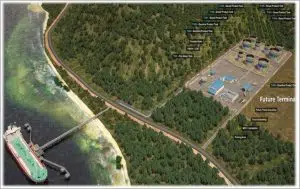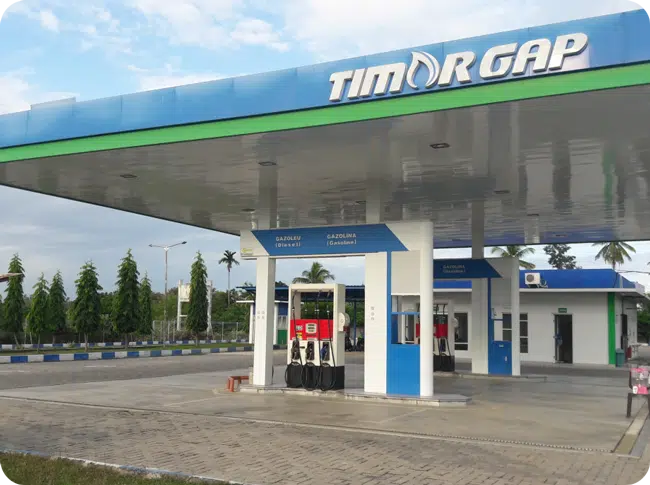TIMOR GAP has a large focus on the business component and in guaranteeing national energy security. With this, several projects are being designed and prepared to create and seize new downstream business opportunities, thus improving the company’s financial performance. Downstream new projects and businesses are described below.
Petroleum Import Terminal
TIMOR GAP continues working towards developing the Petroleum Import Terminal (PIT) as part of its commitment to guarantee energy security through storage and fuel supply. The PIT will respond to the need for increased investment in fuel storage to meet foreshadowed petroleum fuels import requirements and ensure ongoing security of supply.
The terminal is designed to receive and store a total of approximately 110,000 m3 in gross capacity of fuel, including storage tanks for diesel, gasoline, aviation fuel, and LPG which will increase the national storage capacity by 40%. This will allow the terminal to store a fuel stockpile of 120 days, comprising a 90-day national strategic petroleum stock with an additional 30-day fuel stock to be stored by TIMOR GAP for trading purposes.
The Terminal is foreseen to be constructed in Metinaro, Municipality of Dili, on a 186 hectares land plot previously granted to TIMOR GAP through a Land Use Permit issued by the Ministry of Justice through the National Directorate of Land and Properties (Direção Nacional de Terras e Propriedades, DNTP), in 2013.
LNG Import Terminal
On 30 March 2021, TIMOR GAP awarded a contract to Wood Group Kenny Sdn Bhd, a global consulting and engineering company, to perform a six-month Feasibility Study, including assessing the potential market supply for import of LNG (Liquified Natural Gas) to Timor-Leste, develop a concept design for an LNG Import Terminal and associated LNG regasification facilities, identify potential site locations for implementation of the referred Terminal and conduct a site selection assessment.
Developing LNG capabilities would help Timor-Leste’s plan to achieve a significant reduction of both fuel supply cost and greenhouse gas emissions while also converting its main power plants to fire on natural gas. Imported LNG would fuel the existing power plants in Hera, Betano, and Oecusse.
Refinery and Petrochemical Complex
The Betano Refinery and Petrochemical Complex have been subject to extensive and comprehensive technical studies, including the Front-End Engineering Design & Cost Estimation (FEED), Land Survey, Land Development & Cost Estimation, Market Study and the Optimization Design.
In 2021, TIMOR GAP completed the in-house Peer Review Study for the Betano Refinery and Petrochemical Complex with the aim to provide a technical and financial evaluation and propose recommendations to the overall project scope, business strategy and project economics for the Management’s future consideration and decision-making.
The Refinery cluster in Betano will be established through a commercial venture, entrusted to TIMOR GAP to cater the development. The construction of the first refinery in the country will contribute and guarantee the country with energy security, added value to domestically produced condensate field, contribute to economic growth, and creation of direct and indirect employment, releasing and improving the current unemployment rate condition.
LNG Plant
LNG Plant and Pipeline are downstream components of the Timor-Leste Liquefied Natural Gas (TLNG) project planned to be built in the south coast as part of the Tasi Mane Project.
Several activities were performed during the first and second quarter of 2020 under the supervision of the former Management. A pipeline route preliminary investigation was carried out in-house to provide an insight option on the pipeline diversion route to Natarbora, an alternative project location option in lieu of Beaço. Several documents also were prepared such as Terms Of Reference (TOR) and Request For Quotation (RFQ) for pipeline Pre-FEED & Survey Support, tendering plan and Invitation To Bid (ITB) draft. While at the same time, team had prepared a plant layout study scope of work (SoW) for LNG Plant. The RFQ for the Plant Layout Study was issued to Wood Reading Office (legacy AFW), however it was cancelled soon after by the new Management.
The compelling intention to hold LNG project is mainly laying on several upstream issues that must be settled before continuing the Greater Sunrise Project. The discussion on relevant issues is ongoing between Greater Sunrise Joint Venture companies and both countries (Timor-Leste and Australia). These include Petroleum Mining Code, Production Sharing Contract (PSC), Fiscal Regime, and Upstream development concept.
In that regard, any activities related to the LNG plant including the site location for LNG plant will be on hold and subject to the decision agreement from all relevant parties.


